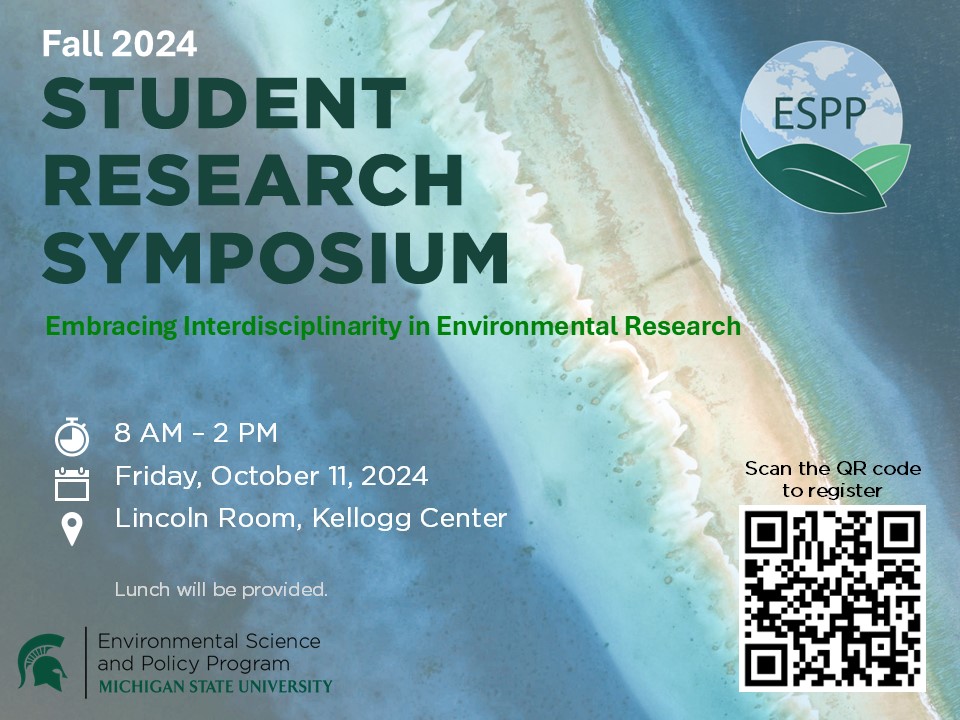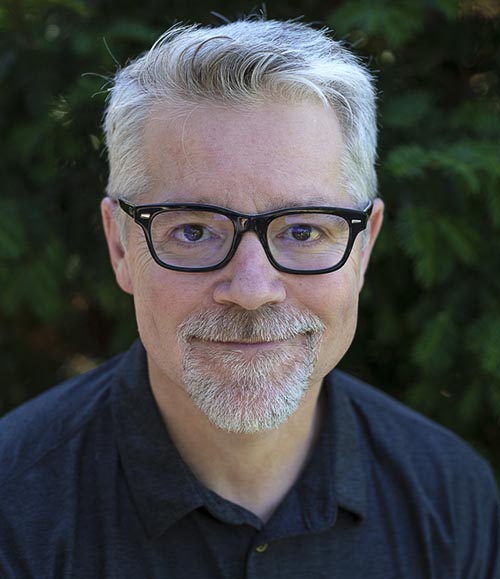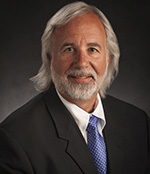ESPP 2024 Fall Student Research Symposium
Fri, October 11, 2024 8:00 AM at Kellogg Hotel and Conference Center

Environmental Science and Policy Program (ESPP) 2024 Fall Student Research Symposium will be held on Friday, October 11, 2024, from 8:00 AM to 2:00 PM in the Lincoln Room at the Kellogg Hotel and Conference Center.
This year's theme, "Embracing Interdisciplinarity in Environmental Research", focuses on innovative approaches to integrating science with policymaking. We seek abstracts from students at all levels, highlighting collaborative effort and knowledge exchange that drive sustainable outcomes. The symposium will serve as a platform for sharing transformative strategies that bridge the gap between policy and practice, promoting long-term ecological balance and socio-economic resilience.
We have accepted over 40 submissions this year, and these presentations will be placed into four oral sessions and one poster session.
Download Symposium Program with All Abstracts
Oral Session Requirements
- Each oral presentation should be kept strictly within 15 minutes, including 12 minutes talk and 3 minutes for Q&A.
- Session chairs will reminder the speakers when they approach the 12-min mark.
Poster Session Requirements
- All posters should be in portrait mode with a maximum dimension of 72 in (H) x 48 in (W). A typical poster can be 54 in x 42 in.
- The poster session will be in the Lincoln Room. Hang your posters on the designated spot on the poster board with push pins before the poster session starts at 12 PM. We strongly encourage you to put up your posters during registration and breakfast.
- Please stand by your poster during the poster session to talk about your work with viewers.
- After the symposium, make sure you take down your poster.
Symposium Schedule
|
Time |
Activities |
| 8:00 - 8:45 AM | Registration and breakfast (Lincoln Room) |
| 8:45 - 9:00 AM | Opening Remarks by Dean Donnellan (College of Social Science) |
| 9:00 - 9:50 AM |
Keynote Talk: Dr. Norbert Kaminski (Pharmacology & Toxicology): Title: The benefits and challenges of interdisciplinary research. NIH Superfund Research Centers as a case study |
| 9:50 - 10:00 AM | Group photo and coffee break (Lincoln Room) |
| 10:00 - 11:50 AM |
Concurrent Oral Sessions
|
| 11:50 - 12:00 PM | Break |
| 12:00 - 1:20 PM | Poster Session (Lincoln Room) |
| 12:30 PM | Lunch (Lincoln Room) |
| 1:20 - 1:50 PM | Oral Session #4 (Lincoln Room) |
| 1:50 - 2:00 PM | Closing Ceremony (Lincoln Room) |
Welcome and Opening Remarks

Dean Brent Donnellan, College of Social Science, Michigan State University
Dr. Brent Donnellan is the Dean of the College of Social Science where ESPP is housed in, and Professor of Psychology. Brent served as the Chairperson of the Department of Psychology from 2018 to August of 2022. He investigates research questions at the intersections of personality psychology, developmental psychology, and psychological assessment. Brent’s current research efforts focus on the assessment of well-being, personality trait development, and methodological reform in psychological science. He is the Senior Personality Editor at Collabra: Psychology and is the co-author with Richard E. Lucas of the Great Myths of Personality published in 2021.
Keynote Speaker

Norbert Kaminski, PhD, Professor of Pharmacology and Toxicology, Director of the Center for Research on Ingredient Safety, and Director of the Institute for Integrative Toxicology, Michigan State University
Norbert Kaminski, PhD is the Director for the Center for Research on Ingredient Safety (CRIS). CRIS is focused on chemical ingredient safety in consumer products including food and beverages. He also is the Director of the Institute for Integrative Toxicology (IIT). IIT is a campus-wide organizing unit for toxicology research and graduate training at MSU. He is also the Food and Consumer Product Ingredient Safety Endowed Chair. He holds joint appointments in the College of Human Medicine and Veterinary Medicine.
He has over 40 years of experience in toxicology with research interests in immunotoxicology and immunopharmacology. He has published over 180 papers in the peer reviewed literature. He has served on scientific advisory committees for National Academy of Science and the US Environmental Protection Agency and has served as a member of the NIEHS National Advisory Environmental Health Sciences Council. Dr. Kaminski served as the President for the Society of Toxicology (2014-2015). He received the Society of Toxicology Merit Award (2020) and the George Scott Award from the Toxicology Forum (2017). Dr. Kaminski received a dual major PhD in Toxicology and Physiology from North Carolina State University.
Title: The benefits and challenges of interdisciplinary research -- NIH Superfund Research Centers as a case study.
Abstract: The objective of this presentation will be to discuss both the benefits and challenges of conducting interdisciplinary research. The NIEHS Superfund Research Program, which funds interdisciplinary P42 Superfund Research Centers (SRC), including the MSU SRC, will be discussed as a case studies. The elements of a P42 SRC will be introduced and then used to provide examples of interdisciplinary collaborations and the advantages this approach provides when tackling complex research problems.
Oral Session #1 (Lincoln Room, Session Chair: Jing Zhou)
| Time | Presenter | Title |
| 10:00 AM | Pei-Jyun Lu | Factors Influencing Policy Termination: Cloud Seeding Program in Kansas |
| 10:15 AM | Sungmin Cheu | Effects of Crop Insurance on Water Use: Mitigating Effects of Irrigation Costs |
| 10:30 AM | Leo Baldiga | The Fading Echo? Stagnation, Diversification, Exit, and Continuity in Aquaculture in Central Thailand |
| 10:45 AM | Parker Hopkins | Agroforestry in the Great Lakes: Assessing Landowner Intentionality and Land Use Practices (Withdrawn) |
| 11:00 AM | Emily Milton | Honest Brokering Isotopic Methods in Environmental Archaeology |
| 11:15 AM | Yousef khajavigodellou | System Thinking of Water Bankruptcy: A Systemic Approach in the Water-Food-Energy Nexus of Transboundary River Basins |
| 11:30 AM | Michele Remer | Tourism and Species Invasion in a Warming Arctic |
Oral Session #2 (Room 103A, Session Chair: Jincheng Huang)
| Time | Presenter | Title |
| 10:00 AM | Angelique Willis | Evaluating Inequity in Drinking Water Violations in Metro Atlanta |
| 10:15 AM | Graham Diedrich | The Race for Renewables: Modeling Renewable Energy Productivity Amid Local Siting Restrictions in Michigan |
| 10:30 AM | Jae-Yu Jung | Do Charging Stations Care About the Electricity Rates? |
| 10:45 AM | Musab Wedyan | Exploring Visitor Satisfaction in Urban Parks: Insights from Sentiment Analysis and Facility Usage |
| 11:00 AM | Johnny Musumbu | Localizing Sustainable Development at Natural World Heritage Sites in Africa: Implications for Conservation and Socioeconomic Development of the OKapi Wildlife Reserve in the Eastern part of the D.R. of Congo. |
| 11:15 AM | Tiffany Williams | Fostering trusting relationships between health agencies and citizens: Centering community vulnerability and increasing perceptions of awareness |
| 11:30 AM | Kate Wernicke | An analysis of previous decision frameworks for prioritizing contaminants in potable water. |
Oral Session #3 (Room 103B, Session Chair: Nudrat Fatima)
| Time | Presenter | Title |
| 10:00 AM | Liang Zhao | Tracking Chlamydia and Syphilis in the Detroit metro area by molecular analysis of environmental samples |
| 10:15 AM | Sandhya Sharma | Spatial and Temporal Drivers of Wildfire Severity in Nepal: A Study with High-Resolution ECOSTRESS Data |
| 10:30 AM | Alexandra Sexton | A new toxicity testing framework: Interpreting complex PFAS mixtures for ecological risk assessment in Daphnia magna |
| 10:45 AM | Lala Kounta | Marine heat waves under climate change and climate intervention |
| 11:00 AM | Muhammad Bilal Zafar | Advancing Flood Resilience through High-Resolution Hydrodynamic Modeling: Insights from the Middle Mississippi River |
| 11:15 AM | Zhicheng Xu | An Integrated Methodology for Evaluating Climate Vulnerability and Resilience in Midwestern Rust Belt Cities: A Framework for Policy Development and Urban Planning |
| 11:30 AM | Tasha Siame | Lead Contaminated Groundwater Exposes Residents to Health Risks in Makululu, Zambia |
Poster Session
| Poster # | Presenter | Title |
| #1 | Daniel Horowitz | Organized Opposition and Support for Renewable Energy Systems in the Midwest |
| #2 | Zhiliang Xu | Transport and Distribution of Per- and polyfluoroalkyl Substances in Soil Profiles from Land Application of Biosolids |
| #3 | Aman Shrestha | Investigating Sustainable Irrigation Practices and Water Management in the Mississippi River Basin using Community Land Model |
| #4 | Mohsen Faghihinezhad | Exploring Substate Amendments for Trichloroethene Biodegradation in Soils and Sediments |
| #5 | Andrew Huang | Evaluation of Cation-Bridging Sorption of Per- and Polyfluoroalkyl Acids by Soils |
| #6 | Clara Graucob | How much resilience is there in urban resilience plans? |
| #7 | Harley Curtiss | Casparian Strip can Reduce PFAS Transport within Plants |
| #8 | Andreana Louise Roxas | Perception of Non-Energy Impacts for Industrial Energy Efficiency Measures in Small and Medium Sized Manufacturers in the Midwest |
| #9 | Maede Dashtpeima | The Overlooked Mechanisms of Atmospheric Microplastics from the Plastic Packaging on the Sources and Regulations. |
| #10 | Phyllis Angemwin Gyang | Addressing Community Vulnerability to Dam-Induced Floods: A Case Study of the Bagré Dam |
| #11 | Coumba Niang | Influence of the Madden Julian Oscillation on extremes precipitations and its state-of-art climate CMIP6 historical simulations over West Africa |
| #12 | Saesol Kang | EPA water quality standards and their influence on water quality |
| #13 | Qucheng Zhang | Between the Lines: A Critical Discourse Analysis of Chinese Climate White Papers |
| #14 | Katherine Foss | Hydrophobicity of Apple Skin: Effects of Waxing and Washing on Interfacial Interactions with Viruses. A comparative U.S.-France-China study |
| #15 | Ahmed Elkouk | On improving land model simulation of reservoir release and storage across the American Southwest |
| #16 | Anurag Ganapathi | Upcycling Polyolefin Waste for Sustainable Hot-Melt Adhesives: Advancing Circularity in Adhesive Production |
| #17 | Mohammed Imran Khan | Advancements in Hypersaline Wastewater Treatment: The Promise of Quasi-Liquid Surfaces to Reduce Salt Scaling |
| #18 | Xin Lan | Forecasting Vertical Lake Water Temperature Profiles with a Process-Guided Deep Learning Approach |
| #19 | Qianqian Dong | Immobilization of PFAS in Soil Amended with Geosorbents |
| #20 | Natalie Overton | Who's Going Green? Mapping Pro-Environmental Consumer and Political Behaviors |
Oral Session #4 (Lincoln Room, Session Chair: Joe Hamm)
| Time | Presenter | Title |
| 1:20 PM | Jayla Simon | Advancing circularity among the built environment through the comprehensive study of the structural lifecycle, Domicology. |
| 1:35 PM | Sampriti Sarkar | Aging infrastructure and altruistic preferences: consumers’ valuation for water and sewer policies |
Faculty Judges
- Anthony Kendall (Earth and Environmental Science)
- Jennifer Carrera (Sociology)
- Wei Zhang (Plant, Soil and Microbial Sciences)
- Geoff Henebry (Geography, Environment, and Spatial Science)
- Soren Anderson (Agriculture, Food, and Resource Economics)
- Yadu Pokhrel (Civil and Environmental Engineering)
- Michael Olabisi (Community Sustainability)
Our Sponsors
The Student Research Symposium is proudly sponsored by:
- Environmental Science and Policy Program
- College of Social Science
- College of Engineering
- College of Natural Science
- Fate of the Earth Endowment
Organizing Committee
Nudrat Fatima (Earth and Environmental Science)
Yousef Khajavigodellou (Geography, Environment, and Spatial Sciences)
Tiffany Williams (Sociology)
Jing Zhou (School of Planning, Design and Construction)
Dr. Joseph Hamm
Ms. Tina Bird
Dr. Lifeng Luo
Event Parking
Parking is available at LOT(S) 66/Ramp 4. Those in attendance can click on the link below or scan the QR code and register their vehicles. Guests will no longer need to visit the pay machines. This is all done online. We encourage guests to register their vehicles prior to the event but can be done the day of the event immediately upon arrival. Changes can be made to their registration any time up until the day of the event, by contacting Parking Services, 517-355-8440.

